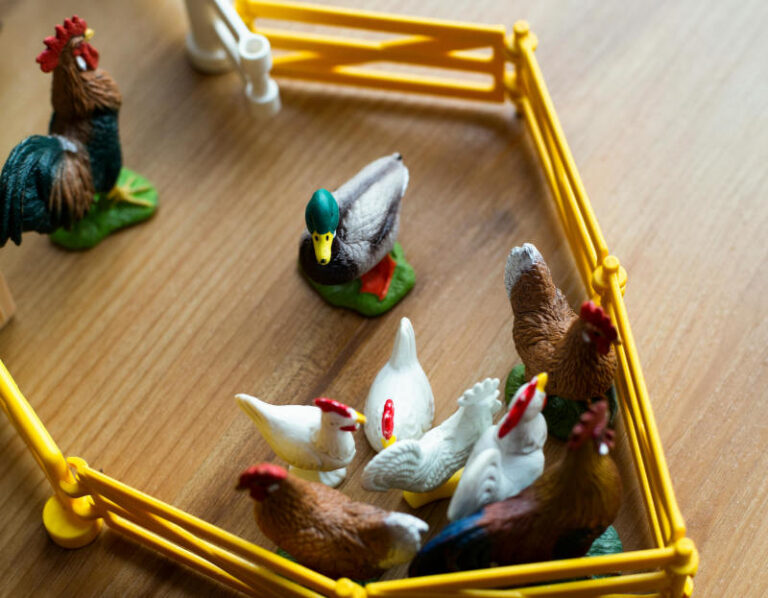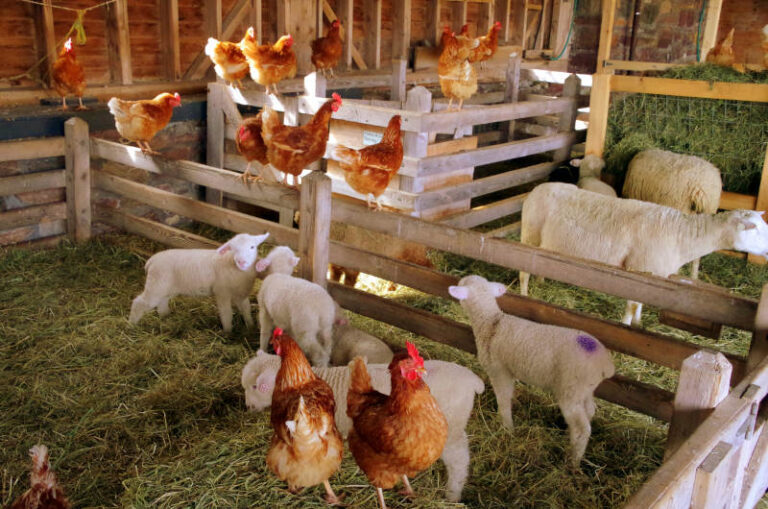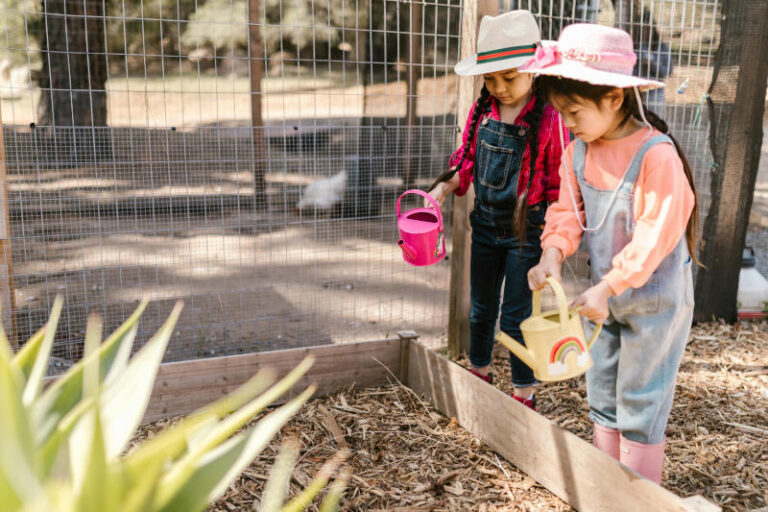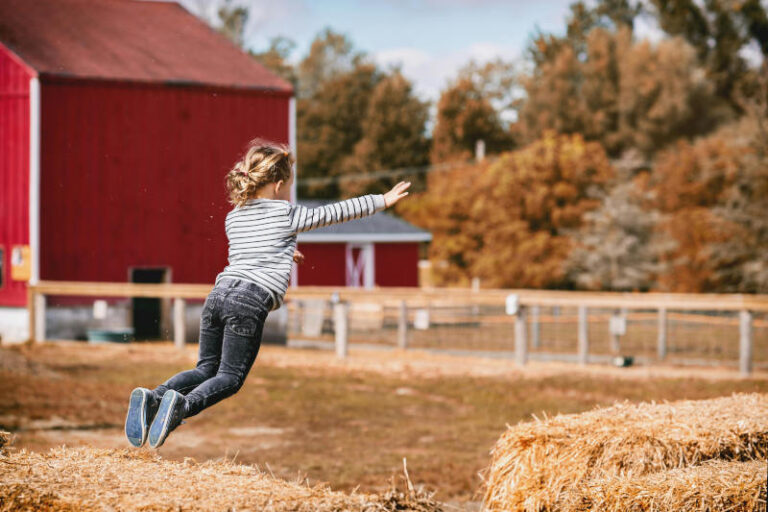Yeehaw! Let’s take the kids on an exciting trip to the farm – without leaving the classroom. Farm-themed activities are perfect for sparking curiosity about animals, plants, and rural life, while also helping little learners develop across various areas of the EYFS.
Here’s a collection of fun, hands-on farm activities for EYFS, complete with all the skills they’ll be developing!
Blossom’s Recommended Farm Activities for Early Years:
Activity 1: Create Your Own Farmyard
Set up a miniature farm using toy animals, fences, and a cardboard or wooden barn. Include sensory materials like straw, soil, and small rocks to create paths and animal pens. Let children organise the animals, build enclosures, and decide where each animal “lives.”

Enhance the activity by discussing the sounds animals make and their roles on the farm (e.g., cows give milk, chickens lay eggs).
EYFS Areas of Learning and Development and Early Learning Goals:
- Understanding the World
- The Natural World:
- Kids learn about farm animals, their habitats, and what they do.
- People, Culture and Communities:
- Discussions about how farms provide food connect the activity to real life.
- The Natural World:
- Expressive Arts and Design
- Creating with Materials:
- Arranging the farmyard and adding sensory elements encourage creativity.
- Being Imaginative and Expressive:
- Role play and animal noises bring the farm to life.
- Creating with Materials:
- Communication and Language
- Listening, Attention and Understanding:
- Following prompts like “Where does the cow go?” develops listening skills.
- Speaking:
- Describing their farm and the animals expands vocabulary and storytelling skills.
- Listening, Attention and Understanding:
Activity 2: Sing Along with Farm Animals
Gather the children for a sing-along session with farm-themed songs like Old MacDonald Had a Farm or Baa Baa Black Sheep. Use puppets, stuffed animals, or pictures to represent each animal, and let children take turns choosing which animal comes next.

Encourage them to mimic animal sounds and movements during the songs for extra fun.
EYFS Areas of Learning and Development and Early Learning Goals:
- Communication and Language
- Listening, Attention and Understanding:
- Kids follow along with songs and animal cues.
- Speaking:
- Singing and imitating animal sounds build confidence and language skills.
- Listening, Attention and Understanding:
- Expressive Arts and Design
- Being Imaginative and Expressive:
- Songs inspire creative expression through music and movement.
- Being Imaginative and Expressive:
- Personal, Social and Emotional Development
- Building Relationships:
- Singing together fosters teamwork and a sense of community.
- Building Relationships:
Activity 3: Farm Animal Counting Game
Use toy farm animals or laminated animal pictures to create a fun counting and sorting game. Ask questions like, “How many pigs can you find?” or “Can you sort the animals by size or colour?”
Add a challenge by lining them up in order of size or matching baby animals with their parents.
EYFS Areas of Learning and Development and Early Learning Goals:
- Mathematics
- Number:
- Counting animals reinforces number recognition and basic maths skills.
- Numerical Patterns:
- Sorting and ordering animals introduces pattern concepts.
- Number:
- Physical Development
- Fine Motor Skills:
- Handling small objects, like toy animals, strengthens the hands and fingers.
- Fine Motor Skills:
- Communication and Language
- Speaking:
- Talking about the animals and their groupings enhances descriptive language.
- Speaking:
Activity 4: Plant and Harvest Vegetables
Create a pretend garden using pots, soil, and vegetable seeds like carrots or beans. Show children how to plant seeds and explain the steps needed for them to grow (e.g., watering and sunlight).

Check the progress daily, and when the vegetables “grow,” let the children “harvest” their crops and discuss how vegetables are used for food.
EYFS Areas of Learning and Development and Early Learning Goals:
- Understanding the World
- The Natural World:
- Children learn how plants grow and why they need care.
- People, Culture and Communities:
- Discussions about farms producing food link to their lives.
- The Natural World:
- Physical Development
- Fine Motor Skills:
- Planting seeds and watering develop precision and hand strength.
- Gross Motor Skills:
- Moving around the garden helps build co-ordination.
- Fine Motor Skills:
- Personal, Social and Emotional Development
- Managing Self:
- Caring for plants encourages responsibility and patience.
- Managing Self:
Activity 5: Farm Animal Obstacle Course
Set up a fun obstacle course where kids can “gallop like a horse,” “waddle like a duck,” or “roll like a pig.” Add tunnels to crawl through, hay bales to climb over, or hoops to jump through.

Use signs or prompts to guide them through each station.
EYFS Areas of Learning and Development and Early Learning Goals:
- Physical Development
- Gross Motor Skills:
- Climbing, crawling, and jumping improve strength and coordination.
- Fine Motor Skills:
- Picking up small props or navigating tight spaces develops precision.
- Gross Motor Skills:
- Expressive Arts and Design
- Being Imaginative and Expressive:
- Pretending to be animals inspires creativity and role play.
- Being Imaginative and Expressive:
- Communication and Language
- Listening, Attention and Understanding:
- Following instructions strengthens focus and understanding.
- Listening, Attention and Understanding:
Farm-themed activities are an ‘udderly’ brilliant way to engage EYFS children while covering all Areas of Learning and Development. From designing a mini farmyard and singing along with animal friends to planting vegetables and racing through obstacle courses, these activities encourage creativity, teamwork, and exploration.
For UK nurseries and early years providers, these farm activities for EYFS are a fantastic way to enhance learning whilst also creating a fun and engaging environment. Plus, they’re sure to leave children feeling confident and curious about the world around them.